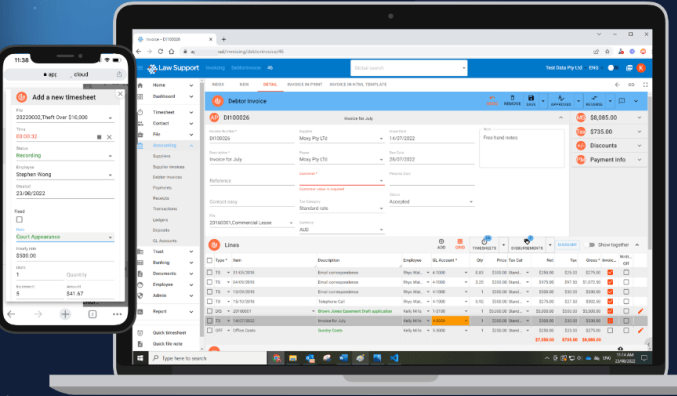In the ever-evolving landscape of the legal industry, staying competitive and efficient is crucial for the success of any law firm. One of the key aspects of law practice management that has a significant impact on a firm’s success is time and billing. Properly tracking and managing billable hours, expenses, and invoicing can be a daunting task, especially for larger law firms with numerous clients and cases. To address this challenge, law firms are turning to time and billing software solutions. In this article, we will explore the impact of law firm time and billing software on your business, including the benefits it offers, the key features to look for, and the importance of making an informed choice.
The Challenge of Time and Billing in Law Firms
Time and billing in law firms is a complex and multifaceted task. Lawyers and legal professionals often work on multiple cases for various clients, each with unique billing arrangements. Keeping track of billable hours, expenses, and disbursements, and generating accurate and timely invoices is crucial not only for the financial health of the firm but also for maintaining client trust and compliance with ethical and legal obligations.
Manually managing time and billing processes can be extremely time-consuming, error-prone, and overwhelming. It can lead to inefficiencies, delayed invoices, disputes with clients over billing, and ultimately, financial losses. This is where time and billing software for law firms comes into play, revolutionizing the way legal practices handle their financial matters.
The Impact of Time and Billing Software
1. Improved Efficiency: One of the most immediate and notable impacts of time and billing software is the significant improvement in efficiency. These software solutions automate many of the time-consuming tasks associated with billing, such as time entry, expense tracking, and invoice generation. This frees up lawyers and legal staff to focus on their core responsibilities – practicing law and serving clients.
2. Accuracy and Error Reduction: Human errors are a common occurrence when managing time and billing manually. Inaccurate time entries and billing mistakes can lead to disputes with clients and even legal malpractice claims. Time and billing software reduces the likelihood of these errors by automating the calculations and generating precise invoices.
3. Consistency and Compliance: Law firms often have to adhere to specific billing guidelines and ethical rules. Time and billing software can be configured to ensure compliance with these rules, promoting consistency in billing practices across the firm. This helps in maintaining a good reputation and client trust.
4. Faster Invoicing: Time is money, and prompt invoicing is essential for maintaining a steady cash flow. Time and billing software accelerates the invoicing process, enabling law firms to send out invoices more quickly and reduce the time it takes to get paid.
5. Client Satisfaction: Clients appreciate accurate, transparent, and timely billing. When a law firm can provide these qualities consistently, it enhances client satisfaction. Satisfied clients are more likely to retain your services and refer new business, which is essential for the growth of any firm.
6. Data Analysis and Insights: Time and billing software also offers valuable data insights. It allows law firms to track and analyze key performance indicators (KPIs) related to billing, such as realization rates, collection rates, and profitability by client or practice area. This data-driven approach can help firms make informed decisions and optimize their financial performance.
Key Features of Time and Billing Software
When considering time and billing software for your law firm, it’s important to look for specific features and functionalities that can address the unique needs of your practice. Here are some key features to consider:
1. Time Tracking: The software should offer robust time tracking capabilities, allowing lawyers and staff to easily record billable hours. Mobile and desktop options for time tracking can be particularly helpful for professionals who are on the go.
2. Expense Tracking: In addition to time, the software should enable the tracking of expenses and disbursements. This feature ensures that all costs associated with a case are accounted for in the billing process.
3. Customizable Billing Rates: Different clients may have different billing arrangements. Look for software that allows you to set and customize billing rates for individual clients or matters.
4. Invoice Generation: The software should offer a user-friendly invoice generation process. Customizable invoice templates, batch invoicing, and the ability to include detailed descriptions of services rendered are essential features.
5. Compliance and Reporting: Ensure that the software can help your firm adhere to industry regulations and ethical standards. It should also provide robust reporting and analytics capabilities to track financial performance.
6. Integration and Collaboration: Look for software that can integrate with other tools your firm uses, such as accounting software, email, or document management systems. Collaboration features for easy communication among team members are also valuable.
7. Mobile Accessibility: In today’s fast-paced legal environment, it’s essential to have access to your time and billing data on the go. Mobile accessibility via apps or mobile-responsive websites is a must.
8. Security and Data Backup: Protecting sensitive financial data is crucial. Ensure that the software has robust security features and provides regular data backups.
9. Client Portal: A client portal feature allows clients to access their invoices, payments, and billing history, promoting transparency and reducing administrative inquiries.
Making an Informed Choice
Selecting the right time and billing software for your law firm is a significant decision that can have a profound impact on your business. To make an informed choice, consider the following steps:
1. Assess Your Firm’s Needs: Start by identifying the specific needs of your firm. What are your billing practices? Do you have unique client requirements? Understanding your requirements will help you narrow down your options.
2. Research and Compare: Research different time and billing software solutions. Consider factors such as user reviews, industry reputation, and the range of features they offer. Create a shortlist of software that aligns with your needs.
3. Request Demos and Trials: Reach out to software providers and request demonstrations and trials. This will allow you to see how the software functions in real-world scenarios and determine its user-friendliness.
4. Evaluate Pricing: Cost is a significant factor, so evaluate the pricing structure of each software option. Consider both the initial setup costs and ongoing subscription fees.
5. Seek References: Don’t hesitate to ask for references from current users of the software. Speaking with firms that have successfully implemented the software can provide valuable insights.
6. Consider Scalability: Think about the future growth of your firm. Will the software be able to accommodate an increase in the volume of clients and cases?
7. Consult with Your Team: Involve your legal team and staff in the decision-making process. Their input can be valuable in choosing software that aligns with their workflow and preferences.
8. Review Support and Training: Ensure that the software provider offers adequate customer support and training. You want to be confident that you can resolve any issues that may arise.
Conclusion
Time and billing software is a game-changer for law firms looking to streamline their financial operations, improve efficiency, and maintain client satisfaction. The impact of implementing such software is profound, as it can lead to increased accuracy, compliance, and faster invoicing, ultimately contributing to the success and growth of the firm.
However, selecting the right time and billing software is not a decision to be taken lightly. It requires a thorough assessment of your firm’s needs, research, and evaluation of software options, and careful consideration of factors such as pricing, scalability, and support.
In today’s competitive legal industry, time and billing software is more than a convenience; it’s a necessity. By embracing these technological solutions, law firms can position themselves for continued success and maintain their standing in a rapidly evolving field. With the right software in place, law firms can focus on what they do best – providing expert legal services to their clients while ensuring their financial matters are in order.



